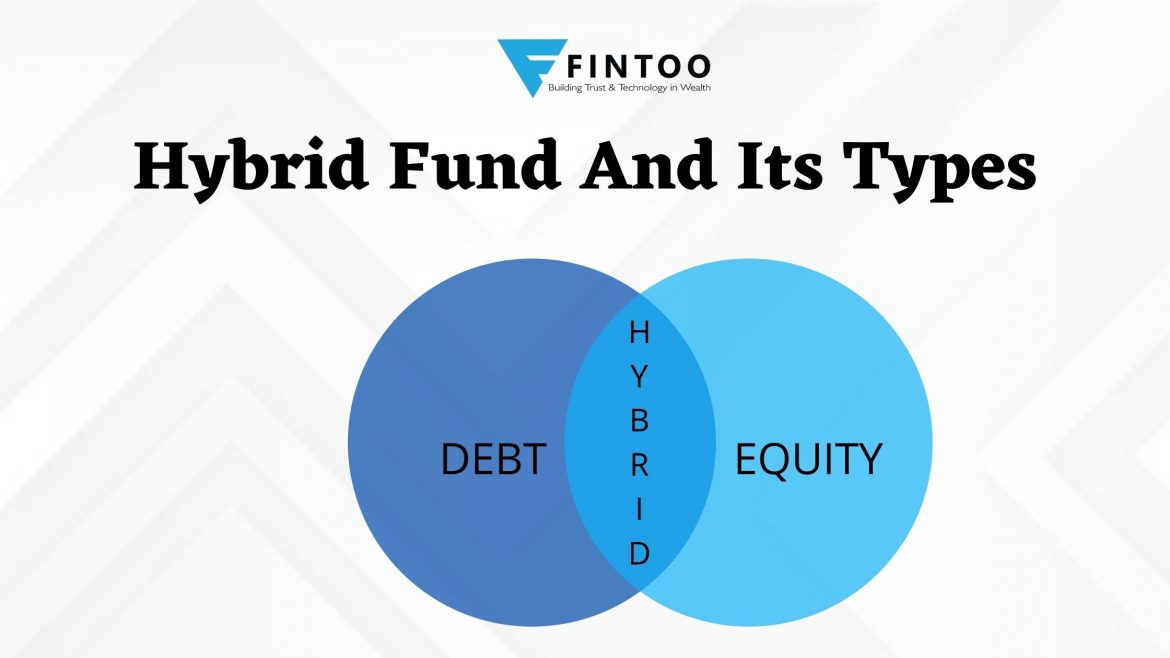

“Mutual funds are subject to market risk, you should read all scheme related documents carefully before investing” this is something which we all have memorized unknowingly, isn’t it? So, as they say, ‘where there is an investment, there is a risk.’ And every investor has a different risk-taking capacity. While some investors prefer to take a high risk to get high returns, some happily settle with low risk and low returns. But, some investors prefer to go for a balanced approach by taking a moderate risk and going for moderate returns. And hybrid funds are the best option for such investors.
Must Read – Points to consider while investing in Mutual Funds
What are hybrid funds?
A hybrid fund is a type of mutual fund that further reinvests in different types of asset classes or assets to produce a dynamic (diversified) portfolio. Typically, hybrid funds are a combination of both equity and debt. These funds will help you to achieve your financial goal with a balanced risk and profit ratio.
Why are hybrid funds less risky? How do they work?
Let us understand this with an example of Mr ABC, who has invested in two classes of assets, namely, equity and debt. The equity investment will offer great returns, although they will be attached with high risk while the debt will offer a stable regular income at comparatively low risk. This means that the probability of losing money is very low. Intrigued? Well, doesn’t this make hybrid funds a great investment? Let us now know the different types of hybrid funds you can invest in!
What are the different types of hybrid funds?
1) Conservative hybrid funds– As the name suggests these funds are for risk-averse investors with not less than 3 years of the investment horizon. In this type, 25% of funds are allocated for equity and the remaining 75% for the debt asset class. The debt class assets are fixed deposit instruments that guarantee a regular income. These funds would be a great choice for investors who have a low-risk profile and cannot withstand too much volatility.
2) Aggressive hybrid funds– Aggressive hybrid funds are for the investors that are looking to take higher risk. As we know the higher the risk, the higher the potential to earn overwhelming returns. Nearly, 75% of the total funds here are allocated to the equity class of asset along with a limited allocation to debt.
3) Multi-asset allocation funds– As Warren Buffet wisely said “Do not put all the eggs in one basket”, investment should always be in a diversified portfolio. In this type of hybrid fund, one invests in at least three classes of assets. The three classes of assets could be debt, gold, or equity. As per the SEBI regulation, the fund manager will invest a minimum of 10% in each class of asset.
4) Dynamic asset allocation– If you are an investor who is looking for a short-term gain, then this hybrid fund is the right choice for you. Dynamic asset allocation fund is also known as a “balanced advantage fund”. It is generally a combination of both, stock as well as fixed financial instruments wherein the investment should be made for a minimum duration of 5 years. Though the dynamic asset allocation is a combination of stocks and fixed financial instruments, but it does not have any fixed proportion for the combination. Here the asset allocation is changed time and again based on the market sentiments which help to generate stable income.
5) Arbitrage fund– Arbitrage funds take advantage of the price difference between the current and future securities markets. The fund manager ensures that he tracks the price difference and to make a profit, he buys in the cash market and sells in future derivatives. Generally, the arrangement of this type of hybrid funds is 65% to 100% in equity.
6) Balanced fund– As the name suggests, the balanced hybrid fund is a balanced combination of both equity and debt. A minimum of 40% and a maximum of 60% is invested in either of the two. For example- if your fund manager invests 55% of the fund in equity, then he/she has to invest 45% in debt. The aim of a balanced hybrid fund is to gain capital appreciation in the long run and make sure the risk is balanced because of debt investments. This is a perfect choice for an investment having a moderate level of risk.
Hybrid funds are very compelling to many investors! But if you are a new investor, then you might need more reasons to invest in them and here are they:-
- Hybrid funds are a safe bet! They allow you to earn a regular income with debt investment and also enables you to get an additional probability of earning higher profits with equity investment.
- As per the statistics, in the past few years, returns on hybrid funds have been higher than most large-cap funds.
- You can diversify your portfolio as per your financial objective. Hybrid funds offer investors the advantage of diversification to ensure stability based on one’s risk appetite.
- Last but not least the expense of running a hybrid fund is very less since most of the funds have a fixed proportion of equity and debt.
Evaluate your capacity for risks before investing!
1) Risk Appetite- Knowing your risk appetite is very important to know which hybrid fund is best suited for you.
2) Monitor- The best way to understand hybrid funds is to do some research and study the past records. Choose a fund that has a record of delivering stable performance.
3) Time- For how long do you want to invest the money? Well, this is another point one must consider while evaluating hybrid funds.
As said, “To get rich you need to be making money while you are asleep!” And one of the best ways to do so would be by investing in hybrid funds. Although we would suggest doing thorough research and consult a financial planning expert who can help you make the right investments!
Must Read: How is china’s Evergrande crisis affecting the global market?
A financial planning platform where you can plan all your goals, cash flows, expenses management, etc., which provides you advisory on the go. Unbiased and with uttermost data security, create your Financial Planning without any cost on: http://bit.ly/Robo-Fintoo
Disclaimer: The views shared in blogs are based on personal opinion and does not endorse the company’s views. Investment is a subject matter of solicitation and one should consult a Financial Adviser before making any investment using the app. Making an investment using the app is the sole decision of the investor and the company or any of its communication cannot be held responsible for it.
Related Posts
Stay up-to-date with the latest information.


